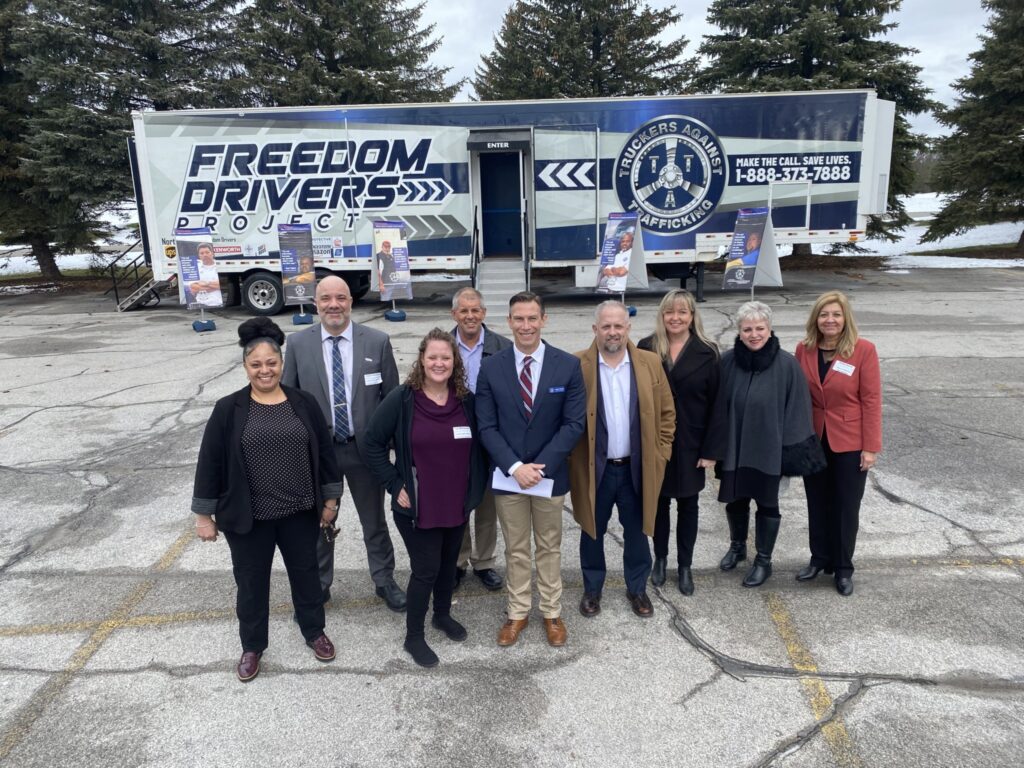Trailer delivers human trafficking message to Canada
The Truckers Against Trafficking trailer isn’t the only tool being used to build awareness around human trafficking, nor the only way the group is spreading the word about a related hotline. But it carries physical artifacts to tell the stories of the victims.
There is the dog tag that a pimp used to identify their “property”. The lipstick and mirror that victims used to prepare themselves for buyers. A prescription bottle to convey the physical injuries endured by a girl trafficked after the age of 12, ultimately requiring 17 surgeries over 20 years.

But the Freedom Drivers Project trailer that is making its first stops in Canada – including a visit to the Truck World trade show – is also teaching truck drivers how to identify human trafficking and fight the crime.
“Canadian drivers safely and diligently deliver goods and services all across North America, and in the course of their everyday jobs they have the opportunity to be a hero to some of the most vulnerable,” said Louie Greek, coalition build specialist with Truckers Against Trafficking.
“That is why Canadian truck drivers are standing up. Because, in order to effectively combat human trafficking, each sector of society must play a part. At any given time, there are more truck drivers out on the road than there are law enforcement officers. Those drivers are the eyes and ears of our nation’s highways.”
Ontario’s 400-Series highways have been identified as known corridors for human trafficking.
“This isn’t an issue that’s happening somewhere else or overseas. This is an issue that’s happening domestically,” he added.
Truckers Against Trafficking first expanded into Canada in 2019, and early last year a Canadian committee of industry leaders and government agencies began working to accelerate the group’s training and messaging alike.
On April 19, the cause brought together Ontario government officials, law enforcement teams, and industry stakeholders in Brampton, to discuss ways to close the loopholes available to traffickers.
“Everybody wants to know what does it look like in my local territory. That way they know how they can be a part of this fight,” said Liz Williamson, a Truckers Against Trafficking training specialist.
“By exposing the realities of these crimes, by becoming trained on the signs of human trafficking, and by working together, we will make a difference in the fight to end human trafficking in Ontario,” Greek said.
“It’s something that everybody needs to get behind,” said Stephen Laskowski, president of the Ontario Trucking Association, which also supports adding anti-trafficking lessons to mandatory entry-level training for truck drivers.
“The more drivers are educated on this, the better off we’ll be.”
Canada’s national human trafficking hotline can be reached by calling 833-900-1010.
Have your say
This is a moderated forum. Comments will no longer be published unless they are accompanied by a first and last name and a verifiable email address. (Today's Trucking will not publish or share the email address.) Profane language and content deemed to be libelous, racist, or threatening in nature will not be published under any circumstances.